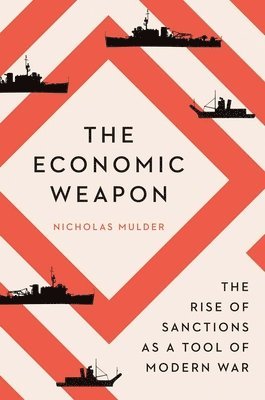
- Format
- Häftad (Paperback / softback)
- Språk
- Engelska
- Antal sidor
- 448
- Utgivningsdatum
- 2023-01-24
- Förlag
- Yale University Press
- Illustratör/Fotograf
- 15 b-w illus
- Illustrationer
- 15 b-w illus.
- Dimensioner
- 234 x 155 x 30 mm
- Vikt
- Antal komponenter
- 1
- ISBN
- 9780300270488
- 613 g
The Economic Weapon
The Rise of Sanctions as a Tool of Modern War
- Skickas från oss inom 5-8 vardagar.
- Fri frakt över 249 kr för privatkunder i Sverige.
Passar bra ihop
De som köpt den här boken har ofta också köpt The SWOT Analysis: Using your Strength to overc... av Lawrence G Fine (häftad).
Köp båda 2 för 412 krKundrecensioner
Recensioner i media
Valuable . . . offers many lessons for Western policy makers today.Paul Kennedy, Wall Street Journal Lucidly written, scholarly and thought-provoking.Gideon Rachman, Financial Times Mulder . . . looks at sanctions over the three decades after the First World Warand reaches unsettling conclusions. . . . The lessons are sobering.The Economist Mulder charts how the rise of economic sanctions and blockade during the interwar years, as a tool to enforce peace, drove the autarkic policies of Nazi Germany and Imperial Japan, ultimately destabilising the international system rather than fortifying it.Robin Harding, Financial Times Mulder argues in his impeccably well-researched and, because of its timeliness, gripping book that sanctions did not stop political and economic disintegration but accelerated it in the interwar period. . . . Mulders book provides an uncomfortable warning that while sanctions have sometimes worked, they have also been contentious, ineffective and counterproductive.Emma Duncan, The Times This revelatory history of economic warfareblockades and sanctionsreminds us that up to 400,000 people died of blockade-induced malnutrition in Central Europe in the First World War, plus 500,000 in the Ottoman Middle East. You will look at twentieth-century history with fresh eyes.Noel Malcolm, Daily Telegraph, Perfect Holiday Reads A Foreign Affairs Best Book of 2022 As Nicholas Mulder shows in The Economic Weapon, a much longer history lies behind the invention of modern sanctions.Tom Stevenson, London Review of Books A fascinating new book. . . . Taken as a superbly researched work of history, it lights up key aspects of the twentieth century in a deeply thought-provoking way.Noel Malcolm, Daily Telegraph Original and persuasive analysis. . . . For those who see economic sanctions as a relatively mild way of expressing displeasure at a countrys behavior, this book, charting how they first emerged as a potential coercive instrument during the first decades of the twentieth century, will come as something of a revelation.Lawrence D. Freedman, Foreign Affairs [A] superb study of sanctions during the interwar era. . . . Mulders fascinating story weaves together politics, economics and law [and] provides invaluable insight into the experience of sanctions one hundred years ago.Max Harris, Times Literary Supplement An excellent historical study. . . . Western countries have directed an unprecedentedly severe battery of punitive economic measures against Russia. . . . For those of us seeking better to understand this reaction and gauge its likely efficacy, there is no better place to turn than Cornell historian Nicholas Mulders erudite and uncannily timely book on the origins of economic sanctions."Alexander Watson, Literary Review Mulders examination of the details of economic diplomacy in the interwar era makes for fascinating reading, and at the least it will remind us that, in the case of determined dictators, something more than sanctions may be needed.Matthew Partridge, Money Week, Book of the Week There are few books that can be said to be timely like Nicholas Mulder's The Economic Weapon . . . [it is] an important contribution to the history of economics and international relations in the interwar period.Roman Kster, sehepunkte Winner of the Stuart L. Bernath Book Prize for best first book by the Society for Historians of American Foreign Relations (SHAFR) Winner of the The Paul Birdsall Prize for European military and strategic history since 1870, sponsored by the American Historical Association The Economic Weapon is a superb account of the history of sanctions, and their profound impact on international politics. Although sanctions were once heralded as a force for peace, Mulder shows they often fail and sometimes make war m
Övrig information
Nicholas Mulder is an assistant professor of modern European history at Cornell University and regular contributor to Foreign Policy and The Nation.


